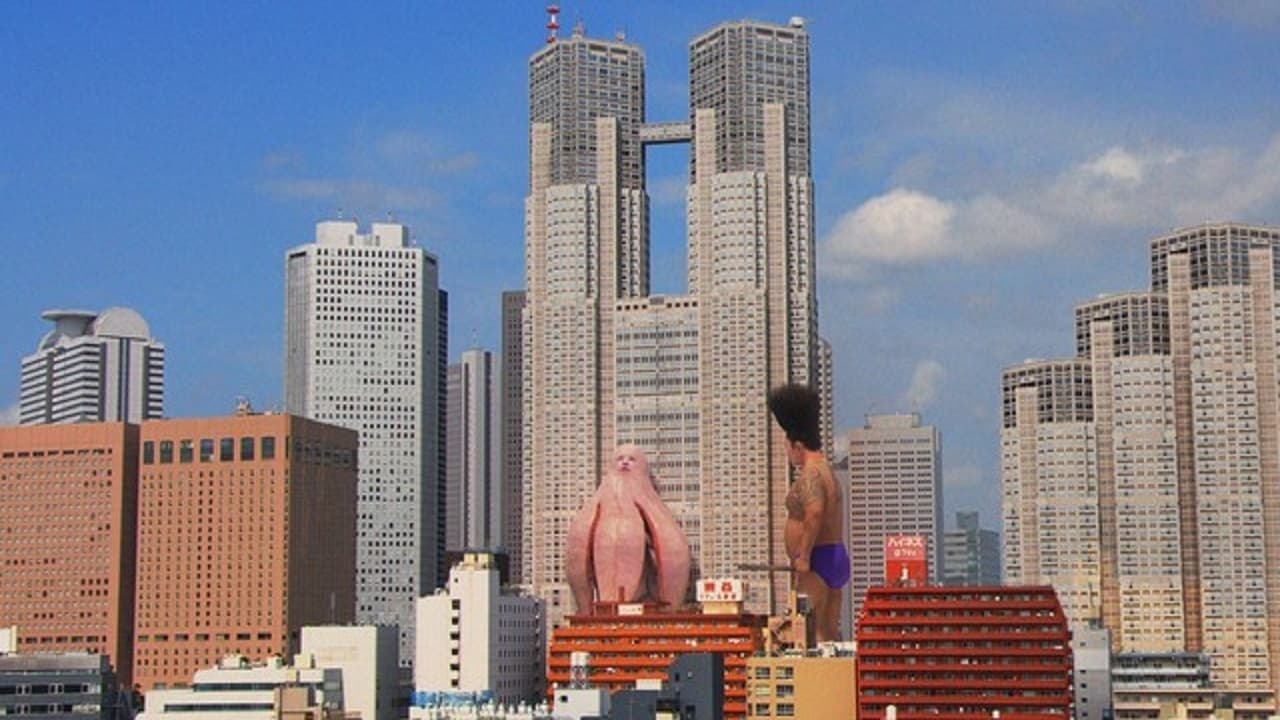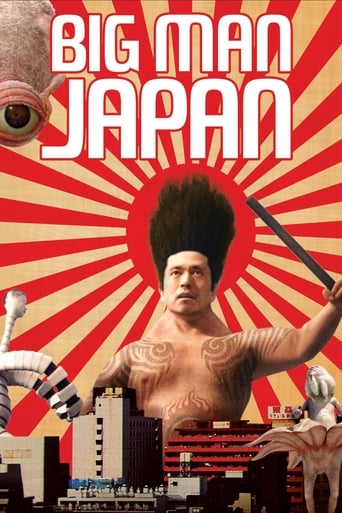



Who payed the critics
Some things I liked some I did not.
Good story, Not enough for a whole film
Clever and entertaining enough to recommend even to members of the 1%
View MoreBeing a fan of director/star Hitoshi Matsumoto's Symbol (2009) didn't truly prepare me for Big Man Japan. Watching any of his films is sure to give any casual viewer a case of cultural whiplash yet Big Man Japan is an entirely different beast. It's a film that in many ways is much more grounded in its themes, telling a very human tale of frustrated potential and quiet desperation. Yet visually Big Man Japan is so f***ing bizarre; uncomfortably mixing the monster destroys tiny models, Power Rangers (1993-1996) aesthetic, while using computer generated kaijus that can only be described as Giger- esque.Matsumoto plays Masaru Daisato, a lonely Japanese man in his early forties living in a decrepit house in Tokyo. Most days he stays at home avoiding the public, venturing out only when he's in the mood for his favorite super noodle shop. He has reason to be nonplussed, his ex- wife (Machida) has custody of his young daughter, the government gives him a measly pension to live on, and his agent (Ua) is finding increasingly contrived ways to get rich off of Masaru's good name. Oh yeah, I almost forgot, when the country is threatened by a city-sized kaiju, Masaru must run to the nearest power station, is electrocuted and is turned into Big Man Japan, Japan's twenty- stories tall protector. He's the latest in a long line of protectors and since the "glory days" of his grandfather(Yazaki), his presence is seen with a mix of ambivalence and hostility.Thematically, Big Man Japan acts as a counter-piece to the justifiably maligned Hancock (2008). The concept is pretty much the same but instead of a misanthropic Will Smith we get a quietly depressed giant and instead of an earnest against-type Jason Bateman we get Japanese popstar Ua constantly clacking away at her Nokia flip-phone. Yet here the overly complicated mythology sorta kind of works. Much of the history of the monsters are given via flashlight illuminated dossier which can be annoying, yet much of the inner logic of the film is left unexplained and inferred visually. This can either be seen as one of Big Man Japan's greatest assets or one of it's most jarring byproducts.Additionally other than the battle sequences between Big Man and the monsters, most of the story is told in a faux cinema verite style. This fly-on-the-wall objectivity let's Matsumoto to truly encapsulate the character in all his underplayed absurdity while giving most things emotional weight and resonance. Stories involving Masaru's overly ambitious father (Toriki) and his now senile grandfather fondly remembered as "The Fourth" prove especially disquieting.If only the battle sequences had the same effect. Despite being prominently featured in promotional materials, they almost appear to be lifted out of another movie entirely, functioning with different pacing and different instincts when it comes to humor. The modelling for downtown Tokyo and Nagoya prove chintzy and the monsters design make them resemble the Macarena baby put through Dr. Frankenstein experiments. Maybe with a bigger budget or a more efficient division of resources, these sequences could have been the nightmare-fuel Matsumoto intend them to be. As it stands, they're just kind of dull.Big Man Japan has all the makings of a cult film. Seeded with a very good high-concept, the flick is mindbogglingly bizarre, sporadically funny and a little more complex than most would give it credit for. Yet it's also repulsively alien in form and presentation guaranteeing that only the least discerning of American audiences will find something worth watching. Otherwise, apart from a hallucinogenic ending that channels the runaway ridiculousness of South Park (1997-Present), I'd just skip it and see something else.
View MoreThe concept is genius; the film takes the form of a mockumentary about a Japanese superhero, Big Man Japan (Hitoshi Matsumoto), an ordinary man who can transform, via a massive electrical shock, into a hundred-foot tall warrior. Apparently this trait is hereditary; his father and grandfather could also do this (in fact his grandfather was a popular hero, shown briefly in doctored WWII clips milling with the troops), and Big Man wonders in the film if the trait has been passed down to his daughter. But the tone of the documentary is what really makes the film; it's exceptionally dry and somewhat dull, like following an average man of little financial means would be. Big Man leads a wholly uninteresting life, until called upon to defend Japan from a marauding giant monster; then he rushes to the nearest electrical station to do his thing and fight whatever freakish thing is attacking (usually the other monsters are grotesque and stupid, more comic than scary). It's a spoof of the giant monster genre in Japan, but it's also a very clever social satire as well, because most people hate Big Man; they graffiti the walls outside his house and leave angry messages on placards on the road to the electrical station (once or twice sitting around his house just talking for the documentary, windows behind Big Man break as people throw bricks through them). The humor is exceptionally clever – and, aside from the scenes with the monsters battling, very low-key. Big Man's wife – no longer living with him – is somewhat ashamed of him, and insists that their daughter's face be pixelated on film. His manager is obviously conning him, and most people treat him with mild disdain. It's an interesting switch from the hero-worship we often see in superhero movies, and it's both more realistic and sublimely comic at the same time. The movie maintains its subtle and gently mocking tone right up until the end, when the final scenes turn to outright parody and we're not entirely sure what happened (did he die? Is this heaven?); it's more quizzical than disappointing, and it's hardly enough of a departure to spoil what is otherwise an inspired parody, probably the best fake documentary since Spinal Tap (and I would argue a better one). This film might not be for everyone – it can move slowly, and it is very Japanese – but it is so astonishingly clever and funny that I was deeply impressed. The film is absurd in all the right ways, and is far, far better than any of the 'straight' superhero movies you'll see any time soon.
View MoreBIG MAN JAPAN is a very clever spoof on 'The Super Hero Genre'. Depressed and middle-aged Daisato plugs along as a second-rate protector of Japan. The film depicts an altered reality in which cartoon monsters sporadically appear to create mischief and mayhem. The Big Man does what he can, but ends up causing as much confusion and destruction as he prevents. Plagued by waning popularity, the erosion of his powers, and family problems, he stoically soldiers on. As a documentary, the film succeeds admirably. We see this man robbed of his destiny, and watch as he explains his half-hearted efforts to regain some sort of balance between what he was, and what he has become. However, the film's special effects are cheesy, but actually add to the representation of a man stuck firmly in a meager existence. Daisato's life is entirely devoid of any social support network. He visits a grandfather, but this man is suffering from dementia in a nursing home, and is in worse shape than our hero. Daisato is allowed visitation with his wife and daughter twice a year, and his 'friendships' are paid geisha girls with whom he drinks heavily. Although a comedy, BIG MAN JAPAN, is not as funny as it is poignant, and this fact makes it a cut above.
View MoreBig Man Japan is a film unlike no other. An homage to monster movies, a swift mockumentary, and a biting satire. The battle scene with the "Stink Monster" is hilarious, but all the other monsters just weren't funny, but borderline disturbing.I'm not giving a synopsis anymore with my reviews because that's just boring and you can find out for yourself. But, here's my opinion: this movie is so weird that it gets uncomfortable after a while. At first it was refreshing and awesome, but then, all of a sudden, it got slightly boring and just too weird.Like I said, the best part of the movie is the fight scene with the Stink Monster and the bizarre ending which has a subtle, but important message within it. I didn't exactly "love" the ending like many people do, but it's still a good ending (and an unexpected one).Definitely not for all tastes.
View More